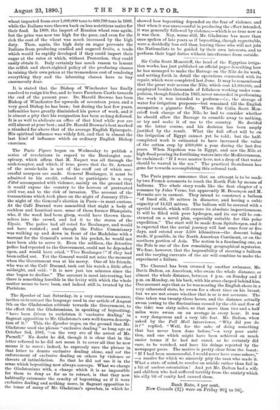The Speaker of last Saturday, in a very courteous manner,
invites us to retract the language used in our article of August 9th on the Gladstonian attitude towards the Government, to the effect that the Gladstonians, in speaking of boycotting, "have been driven to rechristen it exclusive dealing,' in flagrant opposition to Mr. Gladstone's own well-known descrip- tion of it." This, the Speaker urges, on the ground that Mr. Gladstone used the phrase "exclusive dealing" as long ago as October 3rd, 1881, "on the very eve of the arrest of Mr. Parnell." No doubt he did, though it is clear that in the letter referred to he did not mean it to cover all that he now means it to cover ; indeed, he expressly uses the phrase in that letter to denote exclusive dealing alone, and not the enforcement of exclusive dealing on others by violence or threats of intimidation. So that he did not use it in the sense which boycotting now always conveys. What we charge the Gladstonians with, a charge which it is as impossible for them to deny as for us to retract, is that they now habitually extenuate the cruelty of boycotting as if it were exclusive dealing and nothing more, in flagrant opposition to the tenor of many of Mr. Gladstone's speeches, in which he
showed how boycotting depended on the fear of violence, and that when it was unsuccessful in producing the effect intended, it was generally followed by violence,—which is as true now as it was then. Nay, worse still, Mr. Gladstone has more than once spoken of late years as if boycotting, though regrettable, were a decidedly less evil than leaving those who will not join the Nationalists to be guided by their own interests, and to perform their legal duties without interference from outside.


































 Previous page
Previous page